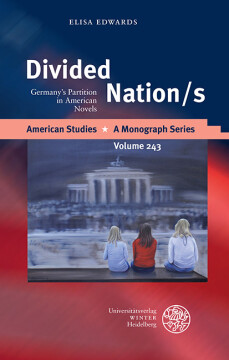
BUCH
Divided Nation/s
Germany’s Partition in American Novels
American Studies – A Monograph Series, Bd. 243
2014
Zusätzliche Informationen
Bibliografische Daten
Abstract
Most American novels Set in Germany and published after 1949 take place in West Germany and present it as a ‘pars pro toto’ for all of Germany, apparently ignoring Germany’s partition. However, just when the Wall that divided the two parts of Germany fell, Germany’s partition and its repercussions moved into the focus of a number of American novelists. Situated within the realm of Transnational American Studies, this volume presents the first comprehensive study of the different renderings of Germany’s partition, the Berlin Wall, and German reunification in American novels published before and after 1989. Covering Cold War spy and romance novels and post-Wall texts such as Jeffrey Eugenides’ ‘Middlesex’, Paul Beatty’s ‘Slumberland’, and Anna Winger’s ‘This Must Be the Place’, the volume analyzes how the novels construct the German and the American nation/s in terms of religion, sex/gender, race/ethnicity, history, exile, and home.
Inhaltsverzeichnis
| Zwischenüberschrift | Seite | Aktion | Preis |
|---|---|---|---|
| Contents | 5 | ||
| Acknowledgements | 9 | ||
| Introduction: The Long Omission and the Sudden Appearance of the Wall | 13 | ||
| Part I: Germany’s Partition in U.S. American Novels before 1989 | 29 | ||
| Germany's Partition and German-American Relations during the Cold War. A Brief Historical Overview | 29 | ||
| Germanys Partition in American Genre Fiction, 1949-1989 | 35 | ||
| “The victorious troops of the world’s greatest power”: Cold War Politics in James McGovern’s Romance Novel Fräulein | 37 | ||
| “East Germany isn’t a very nice place”: Pro-American Discourses in James McGovern’s The Berlin Couriers and James Cross’ The Dark Road | 47 | ||
| Part II: Divided Germany, the Berlin Wall, and German Reunification in U.S. American Novels after 1989 | 65 | ||
| The Fall of the Berlin Wall and the Relations Between the US. and Germany after 1989. A Brief Cultural Overview | 66 | ||
| Cold War Propaganda after the End of the Cold War | 75 | ||
| “With God […], one is able to leap over walls”: German-American Relations and Christian Bias in Robert Elmer’s "The Wall Series" | 76 | ||
| Sexual and Gender Ambiguities | 97 | ||
| “This once-divided city reminds me of myself”: Gender Ambiguity in Jeffrey Eugenides’ "Middlesex" | 98 | ||
| “Apparently this era, which is perhaps really an era of betweenness, is ending”: Coming-of-Age and Bisexuality in J. S. Marcus’ "The Captain’s Fire" | 112 | ||
| The Treatment of Cultural and Ethnic Others | 123 | ||
| “Ignorance resultant from a lack of exposure”: Racial Tensions, Exclusionary Practices, and Freedom in Paul Beatty’s "Slumberland" | 125 | ||
| History, Storytelling, and National Narratives | 147 | ||
| “One nation, still two peoples”: National Narratives and Splits in Ward Just’s "The Weather in Berlin" | 148 | ||
| “It was chaos that brought down the Wall”: Chaos Theory and Historical Storytelling in T. Degens’ "Freya on the Wall" | 171 | ||
| The Exile's Question of Home and National (Not)Belongings after 9/11 | 185 | ||
| “Homes are always provisional”: Exile Experiences in Chloe Aridjis’ Book of Clouds | 185 | ||
| “It isn’t possible to be Jewish and German at the same time”: Bi-national Discourses and Place in Anna Winger’s This Must Be the Place | 205 | ||
| Conclusion: Closing the Gap | 223 | ||
| List of U.S. American Texts about Germany’s Partition | 233 | ||
| Works Cited | 237 |


 Publishing Platform by CloudPublish
Publishing Platform by CloudPublish